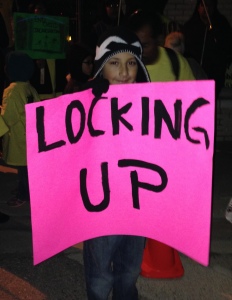
It has been years since I last saw Joe. On Wednesday I saw him vividly on the street in Mississippi, sitting with heartbroken weeping children whose parents were brutally locked up.
I met Joe when he was a successful young engineer. He was married. Had three children whom he adored. People often remarked on his devotion to his kids. He would announce at work without a shred of apology that he could not attend a meeting because one of his children needed him. I met him in a playground in Jerusalem where he often was the only father among a throng of mothers.
Sitting on the bench watching our children play he told me his story. He was born in Poland. HIs father had a small factory with about a dozen workers. The family was assimilated, there was not much Jewish tradition; they spoke Polish at home. On the High Holy Days and Passover they went to Krakow, the nearest large city, to be with their grandparents.
When Joe was 8 years old, a man who worked for his father came to the house and picked up Joe, his brother Nate who was 6 and his baby brother Benny who was 4. “Your father and mother had to go away for a couple of days and I promised to take you to my house.” His parents, he later learned were arrested by the Nazis in a raid on their factory. They managed to secretly ask their employee to take their children and the factory. The man took them to his house. While his wife watched with a grim look, he put them in the attic and told them that from that moment on they must be very quiet not move, not play and no matter what, not yell, cry or make a sound. Benny who was only 4 started crying, “Mamma,” right away. The man took his hand put it on Benny mouth, looked at the four year old and said, “You must never cry again.” To Joe he said, “If he cries again put your hand over his mouth and nose.” For two years the three brothers stayed in the attic. At night when his wife was asleep the man would come up and take the children down to the kitchen and let them move around. He would give them food and water for the next day. “Never open the attic door unless you hear me and my special knock.” For two years they heard the wife tell him, “One day the Germans will come and kill us all.” Whether the man bribed the village people, or no one had known, there was a miracle. No one betrayed them.
When the war was over their father’s sister came to the house. She had blond hair and blue eyes and was given false documents and worked as a maid, and that was how Aunt Leah survived. She came to take them away. And for the first time in two years Benny screamed. “I don’t want to go with you. They will kill us. I am going to stay in the attic.” Their aunt tried to hug him but he ran away and hid behind the man. Leah said “You are Jewish, and it is safe now.” And Benny with all the terror hiding in depth of his throat, sobbed, “I don’t want to be Jewish.” It took serious negotiation to take away the children. The factory was not an issue. Leah signed ownership papers over to the man and his wife. She and the children went to Israel. She raised them with with love and compassion. Benny never forgave her. She loved him anyway.
Shortly after I came to America I lost touch with Joe. A few years ago a friend called to tell me that the day before Joe’s oldest son was about to go the army, Joe died. Suddenly. “His heart,” she told me. I lit a Yahrzeit candle and recited a blessing, “The human soul is a light from God. May the soul of Joe be bound with the souls of our ancestors and the righteous of humanity. Amen.”
On Wednesday Joe was sitting on the curb with terrified Latino/Latina kids, right next to Magdalena Gomez Gregorio, whose father had been detained in the Mississippi brutal raid. Joe and all of us heard when Magdalena sobbed, “Governments please put your heart. Let my parent be free. I need my dad by me. My dad didn’t do anything. He is not a criminal.”
Joe had heard it before. What could I say to Joe? That history repeats itself? That this time around the parents were “only deported?” Should I call Benny and tell him that I saw Joe again? I thought, what if Joe and I could sit again in a playground in Jerusalem or Mississippi? He would look at me with his beautiful eyes and ask, “Do you know that the Latino community here in America is being terrorized? And if you do, you have to do something about it.”
Joe would have been be right. We are now in position to give substance to Never Again. We can resist racism. We can protest senseless attacks on undocumented hardworking immigrants. We can protect the terrorized American Latino community, “We stand with you. Estamos con ustedes.”